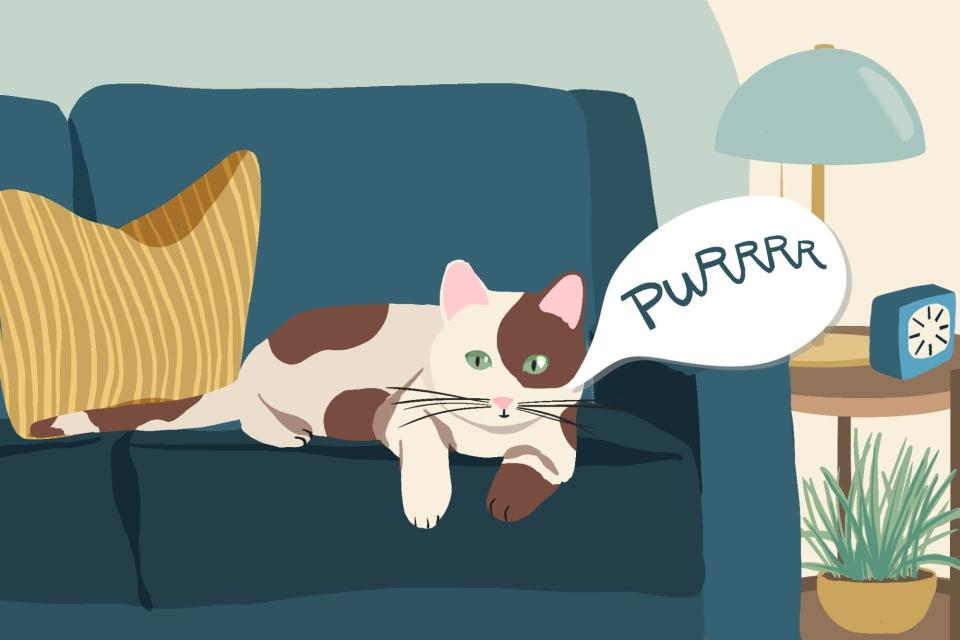Why Do Cats Make Noises, and What Do They Mean?

Cats are generally fairly quiet creatures. Unlike dogs, they don't race to the door when a visitor stops by, barking and vocalizing saying, "Hey, there's someone here!" And it's part of their charm! Dogs are pack animals. Cats are more solitary. We relate. We bow down.
But that doesn't mean cats have nothing to say. While some cats may make no noise at all, other cats can be quite chatty. Felines have a repertoire of vocalizations that they may use for different situations.
According to cat behaviorist Marilyn Krieger, Certified Cat Behavior Consultant in San Francisco (aka The Cat Coach), cats vocalize in a variety of ways. "Cats communicate through vocalizations along with body language. Body positions, eyes, ears, and even fur is part of the communication system," says Krieger, who is also the author of Naughty No More: Change Unwanted Behaviors Through Positive Reinforcement. She recommends that you listen carefully to your cat's noises. "Vocalizations may indicate your cat wants to socialize or be left alone," she says. "Some cat communications mean 'leave me alone' and others say 'I'm friendly. Pet me.'"
Here are some of the most common cat noises and what they mean.

Kailey Whitman
Happy Cat Sounds
Cats produce a number of sounds that indicate good things.
Purring: Sounding like a well-tuned engine, a purring cat is the definition of a happy cat. Purring happens when kittens are nursing from their mothers. But experts say that not all purring signifies happiness. Some cats purr when they are in distress, in a way that helps calm themselves down.
Meowing: There are several kinds of meows. Long meows, short meows. Most meows, experts agree, are meant to communicate with people rather than other cats. Cats can use meows as a greeting or as a way to say, "I'm hungry."
Unhappy Cat Sounds
Cats can also produce sounds that indicate that they are fearful, unhappy, or distressed.
Hissing: There's no mistaking that a cat is upset when it is hissing. Generally, when a cat hisses, it's because it's frightened. This spitty noise is also accompanied by some rather clear body language: bared teeth, widened eyes, ears laying flat backward. Hissing is a cat sound that is clear in its meaning: "Stay back." If your cat is hissing, back away from your cat and let it settle down.
Growling: A more aggressive cat sound is the growl. Some cats will growl to communicate displeasure or anger. As with a hiss, a growl indicates the cat is saying "Back off." If your cat is growling, don't pick it up because it could lash out at you.
Screaming, howling, yowling: Cats can make some very loud noises indeed. And there are many ways to describe a vocalization that also gets its name from the cat. The term caterwauling is defined as to "make a shrill howling or wailing noise like that of a cat." This loud wailing noise can happen when female cats come into heat. Or this sound may be the warning sign that a fight between cats is going to break out. Cats making this sound are distressed or angry. Hopefully, you won't hear this alarming sound coming from your cat often.
Hunting Cat Sounds
Cats are prey animals (and carnivores) so they are naturally engineered to hunt and kill things to eat such as mice and other rodents, birds, and insects. Some cats have a stronger prey drive than others. When a cat sees prey that it can't get to, the cat may vocalize its excitement (and frustration) using chattering, short chirping, or trilling noises. For example, cats may make this noise when sitting in front of a window, watching birds outside. They are simply excited and stimulated by seeing prey. Cheer them on!

